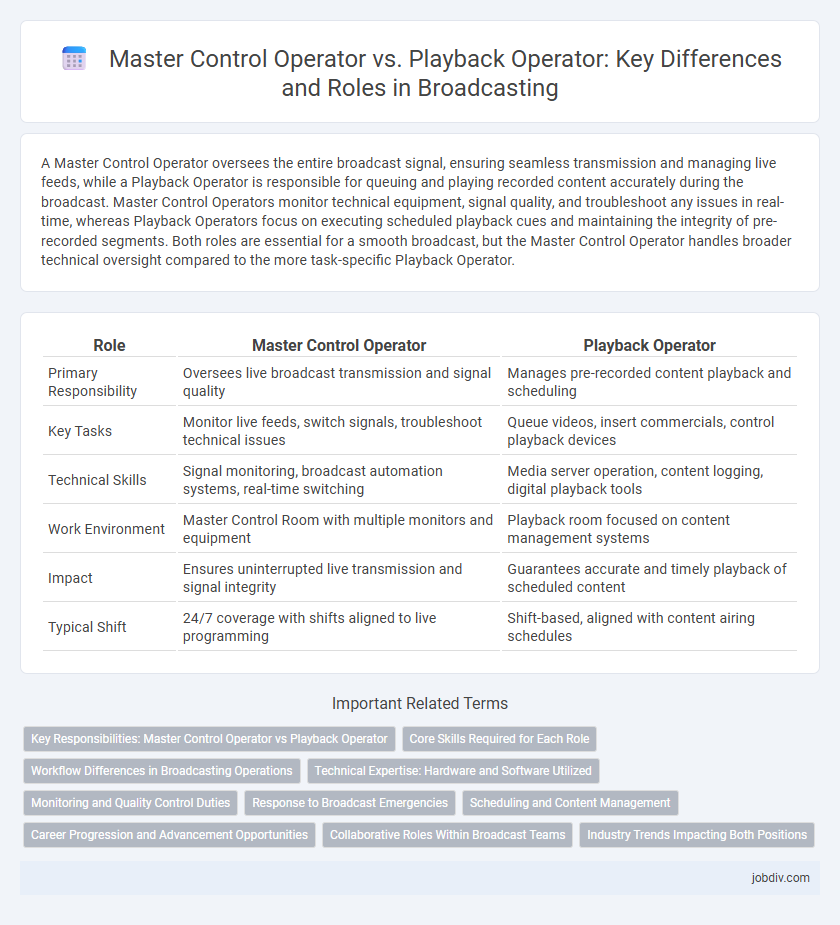A Master Control Operator oversees the entire broadcast signal, ensuring seamless transmission and managing live feeds, while a Playback Operator is responsible for queuing and playing recorded content accurately during the broadcast. Master Control Operators monitor technical equipment, signal quality, and troubleshoot any issues in real-time, whereas Playback Operators focus on executing scheduled playback cues and maintaining the integrity of pre-recorded segments. Both roles are essential for a smooth broadcast, but the Master Control Operator handles broader technical oversight compared to the more task-specific Playback Operator.
Table of Comparison
| Role | Master Control Operator | Playback Operator |
|---|---|---|
| Primary Responsibility | Oversees live broadcast transmission and signal quality | Manages pre-recorded content playback and scheduling |
| Key Tasks | Monitor live feeds, switch signals, troubleshoot technical issues | Queue videos, insert commercials, control playback devices |
| Technical Skills | Signal monitoring, broadcast automation systems, real-time switching | Media server operation, content logging, digital playback tools |
| Work Environment | Master Control Room with multiple monitors and equipment | Playback room focused on content management systems |
| Impact | Ensures uninterrupted live transmission and signal integrity | Guarantees accurate and timely playback of scheduled content |
| Typical Shift | 24/7 coverage with shifts aligned to live programming | Shift-based, aligned with content airing schedules |
Key Responsibilities: Master Control Operator vs Playback Operator
Master Control Operators monitor broadcast signals, ensuring seamless transmission and quality control while managing satellite feeds and troubleshooting technical issues in real-time. Playback Operators handle the accurate cuing, timing, and execution of video content, including commercials, promos, and segments, by operating video playback equipment according to the broadcast schedule. Both roles demand precise coordination to maintain uninterrupted programming but differ in their focus on live signal integrity versus content playback management.
Core Skills Required for Each Role
Master Control Operators require advanced technical skills in signal monitoring, switching equipment operation, and broadcast compliance to ensure seamless transmission and regulatory adherence. Playback Operators focus on precise cueing, timing, and operation of playback devices such as servers and video decks to facilitate smooth content delivery. Both roles demand acute attention to detail, strong troubleshooting abilities, and familiarity with broadcast automation systems to maintain uninterrupted broadcast quality.
Workflow Differences in Broadcasting Operations
Master Control Operators manage the overall broadcast signal flow, ensuring seamless transmission, monitoring technical quality, and switching between live feeds and prerecorded content. Playback Operators focus on cueing, controlling, and playing prerecorded media such as commercials, promos, and segments within scheduled programming. Workflow differences center on Master Control Operators overseeing real-time broadcast continuity and troubleshooting, while Playback Operators handle precise timing and content playback within the broadcast schedule.
Technical Expertise: Hardware and Software Utilized
Master Control Operators typically handle advanced broadcast automation systems, video servers like Grass Valley or Sony, and signal routing hardware to ensure seamless transmission. Playback Operators focus on operating clip players, playlist management software, and ingest tools such as EVS or Dalet, emphasizing precise content cueing. Both roles demand proficiency in broadcast-specific hardware and software but differ in their engagement with live signal control versus scheduled content playback.
Monitoring and Quality Control Duties
Master Control Operators ensure broadcast signal integrity by continuously monitoring technical equipment, addressing signal disruptions, and maintaining compliance with FCC regulations to guarantee uninterrupted transmission. Playback Operators focus on cueing, airing pre-recorded content, and verifying audio and video quality before and during playback to maintain program standards. Both roles are critical for quality control, with Master Control Operators emphasizing overall broadcast stability and Playback Operators concentrating on content accuracy and timing.
Response to Broadcast Emergencies
Master Control Operators coordinate signal integrity and swiftly execute emergency protocols, ensuring uninterrupted broadcast during critical incidents. Playback Operators manage content playback but rely on Master Control Operators for real-time response to emergencies, limiting their direct involvement in crisis mitigation. Efficient communication between both roles is essential to maintain broadcast continuity and compliance with regulatory emergency directives.
Scheduling and Content Management
Master Control Operators oversee the real-time scheduling and monitoring of broadcast content to ensure seamless transmission and compliance with regulatory standards. Playback Operators manage the precise cuing and delivery of pre-recorded programs, commercials, and promos according to the scheduled playlist. Effective coordination between scheduling systems and content management databases is critical for both roles to maintain uninterrupted broadcast flow.
Career Progression and Advancement Opportunities
Master Control Operators often experience broader career progression opportunities compared to Playback Operators due to their responsibilities overseeing entire broadcast transmissions and troubleshooting technical issues in real time. Playback Operators typically start in entry-level roles managing content playback and can advance by gaining experience and certifications, potentially moving into Master Control positions or other technical broadcast roles. Career advancement for both roles is enhanced by mastering broadcast automation systems, understanding transmission standards, and developing strong problem-solving skills.
Collaborative Roles Within Broadcast Teams
Master Control Operators ensure seamless broadcast transmission by monitoring signal quality and managing live feeds in real-time, while Playback Operators handle pre-recorded content, cueing and triggering segments accurately. Both roles require precise coordination to maintain broadcast continuity, with Master Control Operators overseeing overall signal integrity and Playback Operators executing scheduled content playback. Their collaborative efforts are critical in delivering uninterrupted programming and swift issue resolution within broadcast teams.
Industry Trends Impacting Both Positions
Master Control Operators and Playback Operators face evolving industry trends such as automation advancements and the integration of cloud-based workflows, which streamline broadcast operations and reduce manual intervention. The growing demand for high-quality, multi-platform content delivery compels both roles to adapt by mastering advanced software tools and ensuring seamless content transmission across diverse channels. Increasing emphasis on real-time analytics and remote monitoring further transforms operational responsibilities, necessitating continuous upskilling in emerging broadcast technologies.
Master Control Operator vs Playback Operator Infographic

 jobdiv.com
jobdiv.com